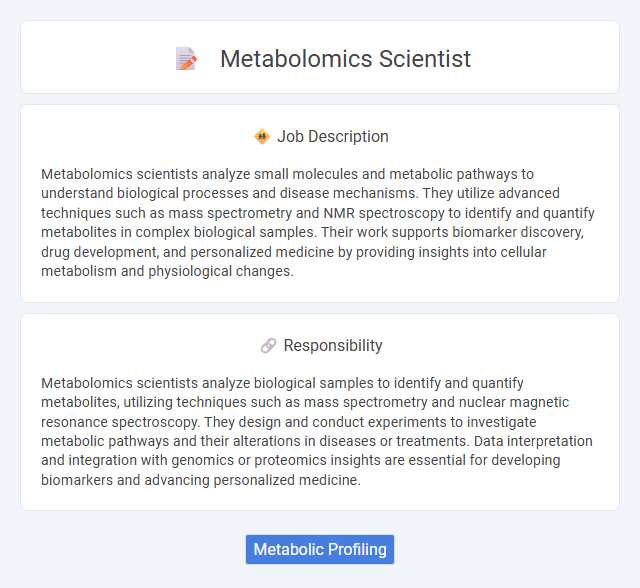
Metabolomics scientists analyze small molecules and metabolic pathways to understand biological processes and disease mechanisms. They utilize advanced techniques such as mass spectrometry and NMR spectroscopy to identify and quantify metabolites in complex biological samples. Their work supports biomarker discovery, drug development, and personalized medicine by providing insights into cellular metabolism and physiological changes.
Individuals with a strong background in biochemistry, molecular biology, and data analysis are likely to be well-suited for a career as a metabolomics scientist. Those who have an aptitude for interpreting complex biochemical data and a keen interest in understanding metabolic processes may find this role particularly fitting. Candidates who thrive in detailed laboratory work and interdisciplinary collaboration might have higher chances of success and job satisfaction in this field.
Qualification
A Metabolomics scientist typically holds a Ph.D. or Master's degree in biochemistry, molecular biology, or related fields, with extensive experience in mass spectrometry, NMR spectroscopy, and chromatography techniques. Proficiency in data analysis software such as MetaboAnalyst, XCMS, or Compound Discoverer, combined with a strong background in chemometrics and bioinformatics, is essential. Expertise in sample preparation, metabolic pathway analysis, and the ability to interpret complex biological datasets are critical for success in this role.
Responsibility
Metabolomics scientists analyze biological samples to identify and quantify metabolites, utilizing techniques such as mass spectrometry and nuclear magnetic resonance spectroscopy. They design and conduct experiments to investigate metabolic pathways and their alterations in diseases or treatments. Data interpretation and integration with genomics or proteomics insights are essential for developing biomarkers and advancing personalized medicine.
Benefit
Metabolomics scientists likely experience significant career benefits, including opportunities to contribute to groundbreaking medical and environmental research. Their expertise may lead to advances in personalized medicine and biomarker discovery, enhancing healthcare outcomes. Job roles in this field often offer competitive salaries and access to cutting-edge technology in multidisciplinary teams.
Challenge
Metabolomics scientists likely face the challenge of managing and interpreting complex, high-dimensional data sets derived from various biological samples. The probability of encountering difficulties in integrating multi-omics data to draw meaningful biological conclusions is significant. Navigating rapidly evolving technologies and ensuring reproducibility in experiments may also present ongoing challenges in this field.
Career Advancement
Metabolomics scientists leverage advanced analytical techniques such as mass spectrometry and nuclear magnetic resonance to identify and quantify metabolites, driving innovations in biomarker discovery and personalized medicine. Career advancement opportunities include leading interdisciplinary research teams, contributing to pharmaceutical development pipelines, and progressing into senior roles such as principal investigator or laboratory director. Expertise in data integration and bioinformatics enhances prospects for leadership positions in academia, biotechnology, and clinical research organizations.
Key Terms
Metabolic Profiling
Metabolomics scientists specializing in metabolic profiling analyze complex biological samples to identify and quantify metabolites, enabling the understanding of biochemical processes and disease mechanisms. They employ advanced analytical techniques such as mass spectrometry and nuclear magnetic resonance spectroscopy to generate comprehensive metabolic profiles. Expertise in data analysis, bioinformatics, and pathway mapping is essential to interpret results and contribute to biomarker discovery and therapeutic development.
 kuljobs.com
kuljobs.com